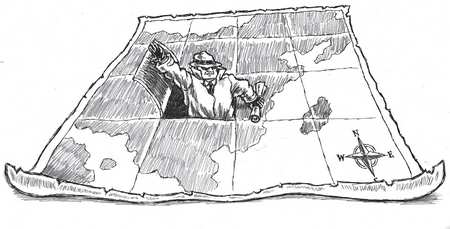Illegal mapmakers mostly foreigners
There's something about maps that Lao Zhu, 27, a Beijing-based publishing house editor, can't resist.
He is one of many Chinese on the Internet who are crazy about creating local maps of little-known streets, certain neighborhoods and other places and then sharing the information with the public. But not all of it is legal.
 |
|
Illegal mapmakers mostly foreigners. [Illustrations: Peter C. Espina] |
Zhu was working on a map that would have included streets, alleys and neighborhoods around military sites that are not included in official maps found in bookstores and other shops.
"I was crazy about making my own maps since I was young," Zhu said.
Zhu spent several weekends mapping the district around the China Military Museum, where some impor-tant military zones are located, before he halted the project.
"As far as I know, those zones are not marked on maps, but I tried every means to make clear the specific locations, street numbers and other information, and I'm proud of it," Zhu said, leaning back in his chair.
For security concerns, Chinese maps contain no detailed information about military areas or other sensitive districts such as the neighborhood around Tian'anmen Square. There are many people, most of whom are military fans, who enjoy making homemade maps of these districts.
Zhu was planning to upload his map onto the Internet and then invite Web users, especially other map fans, to help improve his work.
However, after news was released about a US geologist was sentenced early this month to eight years in prison by a Beijing court for stealing State secrets, he changed his mind.
Xue Feng, 44, a US citizen who was born in China, was detained in November 2007 after arranging the sale of a database about China's oil industry. The information included geographical coordinates and reserves of over 30,000 oil fields. He was planning to sell it to his employer at the time, Colorado-based consulting firm IHS Energy, now known as IHS Inc, Reuters reported.
 0
0 







Go to Forum >>0 Comments